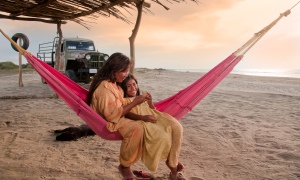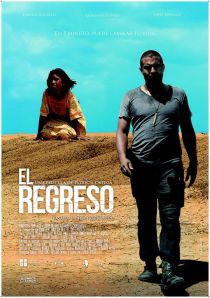Guest blogging this post for wiftv.wordpress.com, I was truly impressed by this beautiful film.

The festival feature El Regreso / the Return is an opportunity to experience a heart-wrenching, beautifully lensed film made in Venezuela.
Apart from the obvious cinematic qualities of the film, including the excellent direction of lay child actors by debut filmmaker Patricia Ortega, the VIWIFF selection committee was particularly struck by the true events behind the story, a decade-old brutal massacre of an indigenous coastal community in Colombia, near the Venezuelan border.
a decade-old brutal massacre of an indigenous coastal community in Colombia, near the Venezuelan border.
In the film, a 10-year-old girl is forced to flee her seaside home for an unknown city in Venezuela, after her local indigenous community was ambushed and murdered by thugs.
Watch the trailer here:
http://vimeo.com/69397216
So what happened?
On April 18, 2004, paramilitary groups of the United Self-Defense Forces of Colombia Wayuu Counter-Insurgency Bloc brutally killed at least 12 people in the Wayuu community of Bahía Portete, in the Colombian territory of Guajira, a region split between Colombia and Venezuela. Hundreds of people were displaced against their will and many, including orphaned children, took refuge in neighbouring Venezuela.
In an interview with Cultural Survival, witness Débora Barros Fince recounts what happened to the fishing community, which consisted mainly of two families who had lived there for over 500 years.
 According to Barros Fince, paramilitaries had been vandalizing and bullying the community for months, stealing animals and goods from them. The paramilitaries were interested in using the beaches for drug trafficking and wanted to do away with the local population, she said. When Two Wayuu men filed a complaint with the local police, they were murdered by the paramilitaries just hours later. Similar executions followed in the next few months, she said.
According to Barros Fince, paramilitaries had been vandalizing and bullying the community for months, stealing animals and goods from them. The paramilitaries were interested in using the beaches for drug trafficking and wanted to do away with the local population, she said. When Two Wayuu men filed a complaint with the local police, they were murdered by the paramilitaries just hours later. Similar executions followed in the next few months, she said.
Barros Fince states she believes the Colombian army was informed, if not involved in the deadly attack against the civilians, including women, children and elderly, on the day of the massacre.
Because the survivors were distrustful towards the Colombian government and army, they fled to the town of Maracaibo in Venezuela, where Barros Fince rose to a community leader.
In 2011, a PBS documentary returned to Bahia Portete with Barros Fince and other survivors.
Filmmaker Ortega inspired by survivors
Venezuelan filmmaker Patricia Ortega was indignant by the lack of public interest and the recounts of the survivors, she told Women In Film & Television Vancouver in an interview translated from Spanish:
“Impunity for this massacre, pain and xenophobia experienced by survivors were the main elements that moved me to tell this story as a necessity. I wanted to scream to the world through this movie, we cannot remain indifferent to the death or horror, and we can not continue to discriminate against anyone who comes from a different culture,” says Ortega.
“Latin Americans complain of discrimination by Europe and the United States, but we also marginalize and discriminate against our indigenous peoples.”
 She decided to tell her film from the point of view of a young girl, to make the story more universal, but also to avoid having to depict an exact description of the facts, which is difficult in a covered-up massacre.
She decided to tell her film from the point of view of a young girl, to make the story more universal, but also to avoid having to depict an exact description of the facts, which is difficult in a covered-up massacre.
“Although this massacre took place on the border with our country and the survivors live among us, in Venezuela, very little is known about this massacre, the Zulia newspapers reported hard fact, but national newspapers and television stations did not pay much attention,” Ortega says.
“When I premiered my film El Regreso, people wondered, astonished if the facts were true. They could not believe that something like this had happened so close to us. It is very sad that from the media point of view the marriage of a movie star is more important than a terrible and unfair fact such as the Portete Bay massacre.”
Produced with Global Film Initiative
 El Regreso was produced with the funding by Venezuela’s National Autonomous Cinematography Center (CNAC) and the Global Film Initiative, a San Francisco-based international arts organization that promotes cross-cultural understanding through the medium of cinema. Ortega also received help from the cultural foundation PDVSA LA ESTANCIA in her hometown, Maracaibo.
El Regreso was produced with the funding by Venezuela’s National Autonomous Cinematography Center (CNAC) and the Global Film Initiative, a San Francisco-based international arts organization that promotes cross-cultural understanding through the medium of cinema. Ortega also received help from the cultural foundation PDVSA LA ESTANCIA in her hometown, Maracaibo.
The tight budget was strained by having to reconstruct the Wayuu village on a beach in the state of Zulia, Venezuela. It took Ortega six months of intense casting to find the right children and adult lay actors among the Wayuunaiki -speaking inhabitants of the country.
“Despite the economic effort it cost us, the result was to find children, wonderful girls and adults who could interpret our history with sincerity,” says Ortega. “Daniela Gonzalez, the girl who plays the character of Shuliwala, lives in a poor neighbourhood of Zulia state . . . She did not have any knowledge or previous experience in acting, but her talent impressed us and we feel that without her, our film it would not have been possible. Most of the indigenous actors who worked on the film had no experience, but they had the need to report this slaughter.”
Severe weather conditions on the beach demanded a lot of overtime, and the need to depict realistic locations in the city meant situations were often uncontrollable, forcing the team to use a mix of fictional and documentary takes.
“The Return to us as a team became a great managerial, cultural and human challenge,” says Ortega, who adds she and producer Sergio Gómez Antillano are proud and happy to have finished the production
The film was awarded Best Feature Film, Best Cinematography, Best Art Direction, and Best Actress (Daniela González) at Festival entre Largos y Cortos de Oriente “ELCO 2013” in Venezuela and considered “one of the jewels of the IX edition of the Venezuelan Film Festival in Mérida.”
Ortega’s next film will yet again deal with a taboo issue: intersexuality.
By Katja De Bock
El Regreso will be shown with two Venezuelan shorts on Saturday, March 8th, 3:30 p.m. at the Vancity Theatre. The screening will be followed by a panel discussion with the Venezuelan filmmakers and other experts.
Information on tickets here.
Women in Film and Television Vancouver Blog
 What strikes one right away in this erotic tale written, directed and produced by Vancouver filmmaker Marie Kâ, are a wide pallet of bright colours and ubiquitous sunshine.
What strikes one right away in this erotic tale written, directed and produced by Vancouver filmmaker Marie Kâ, are a wide pallet of bright colours and ubiquitous sunshine.


 a decade-old brutal massacre of an indigenous coastal community in Colombia, near the Venezuelan border.
a decade-old brutal massacre of an indigenous coastal community in Colombia, near the Venezuelan border. According to Barros Fince, paramilitaries had been vandalizing and bullying the community for months, stealing animals and goods from them. The paramilitaries were interested in using the beaches for drug trafficking and wanted to do away with the local population, she said. When Two Wayuu men filed a complaint with the local police, they were murdered by the paramilitaries just hours later. Similar executions followed in the next few months, she said.
According to Barros Fince, paramilitaries had been vandalizing and bullying the community for months, stealing animals and goods from them. The paramilitaries were interested in using the beaches for drug trafficking and wanted to do away with the local population, she said. When Two Wayuu men filed a complaint with the local police, they were murdered by the paramilitaries just hours later. Similar executions followed in the next few months, she said. She decided to tell her film from the point of view of a young girl, to make the story more universal, but also to avoid having to depict an exact description of the facts, which is difficult in a covered-up massacre.
She decided to tell her film from the point of view of a young girl, to make the story more universal, but also to avoid having to depict an exact description of the facts, which is difficult in a covered-up massacre. El Regreso was produced with the funding by Venezuela’s
El Regreso was produced with the funding by Venezuela’s